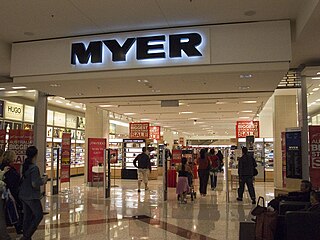
Southern Cross railway station is a major railway station in Docklands, Melbourne. It is on Spencer Street, between Collins and La Trobe streets, at the western edge of the Melbourne central business district. The Docklands Stadium sports arena is 500 metres north-west of the station.

Myer is an Australian mid-range to upscale department store. It trades in all Australian states and one of Australia's two self-governing territories. Myer retails a broad range of products across women's, men's, and children's clothing, as well as footwear and accessories, cosmetics and fragrance, homewares, electrical, connected home, furniture, toys, books and stationery, food and confectionery, and travel goods.

Woolworths Group Limited is an Australian multinational retail and finance company, primarily known for the operation of its retail chain Woolworths Supermarkets across Australia, Woolworths in New Zealand and its discount department store Big W. Headquartered in Bella Vista, Sydney, it is the largest company in Australia by revenue and number of employees, and the second-largest in New Zealand.

Cremorne is an inner-city suburb in Melbourne, Victoria, Australia, 3 km (1.9 mi) south-east of the Melbourne central business district, located within the City of Yarra local government area. Cremorne recorded a population of 2,158 at the 2021 census.
Coles Supermarkets Australia Pty Ltd, doing business as Coles, is an Australian supermarket, retail and consumer services chain, headquartered in Melbourne as part of Coles Group. Founded in 1914 in the suburb of Collingwood by Sir George Coles, the company currently operates 846 supermarkets throughout Australia, including several now re-branded Bi-Lo stores. Coles has over 120,000 employees and accounts for around 27 per cent of the Australian market.

Kmart Australia Limited is an Australian chain of retail department stores owned by the Kmart Group division of Wesfarmers.

Westfield Southland is a shopping centre in the suburb of Cheltenham in Melbourne, Australia. Southland has a floor area of 129,180m², making it one of the biggest shopping centres in Australia by size. There are approximately 400 retailers in Southland, including Myer, David Jones and Harris Scarfe. According to the Melbourne 2030 Metropolitan Strategy, Southland is recognised as one of 26 Principal Activity Centres. The centre is also one of the most profitable shopping centres in Australia, with an annual turnover of $857.9-million recorded in 2016.

Target Australia Pty Ltd is a department store chain owned by Australian retail conglomerate Wesfarmers. Target stocks clothing, cosmetics, homewares, electronics, books, and toys selling both in-store and online. The company's head office is located in the Melbourne suburb of Williams Landing which the company moved to in 2018. Despite the identical logo, name and similar type of outlets, Target Australia carries no direct relation or affiliation to the American retailer Target Corporation.

Daiso Industries Co., Ltd. is a large franchise of 100-yen shops founded in Japan. Its headquarters are in Higashihiroshima, Hiroshima Prefecture. Daiso has locations in 25 countries and regions worldwide.

Westfield Fountain Gate is a super-regional shopping centre located in Narre Warren in the south-eastern suburbs of Melbourne, Australia. It is the second largest shopping centre in Australia by both floor area and number of anchor tenants. However, it is the largest shopping centre in Australia with all 3 discount department stores, Big W, Target and Kmart.

Harris Scarfe is an Australian retailer that sells bed linen, kitchenware, homewares, electrical appliances and apparel. It was founded in 1849 in Adelaide, South Australia and has more than 50 stores nationally.

Woolworths Supermarkets is an Australian chain of supermarkets and grocery stores owned by Woolworths Group. Founded in 1924, Woolworths is currently Australia's largest supermarket chain with a market share of 32.5% as of 2023.
T.J. Morris Limited is a British variety store chain founded in 1976 by Tom Morris in Liverpool, England, as Home and Bargain.

Swan Street is a major street running through the Melbourne suburbs of Richmond, Cremorne and Burnley. The street was named after the White Swan Hotel, built in 1852 on the corner of Swan and Church Streets.
Venture was a chain of discount department stores that operated in Australia between 1970 and 1994.

Swan & Edgar Ltd was a department store, located at Piccadilly Circus on the western side between Piccadilly and Regent Street established in the early 19th century and closed in 1982.

99p Stores Ltd. was a family-run business founded in January 2001 by entrepreneur Nadir Lalani, who opened the first store in the chain in Holloway, London, with a further three stores opening later that year. In 2002, Lalani decided to expand the business throughout the UK and had rapidly developed 99p Stores, operating a total of 129 stores as of March 2010 and serving around 1.5 million customers each week, undercutting their main rival Poundland by a penny. As of mid-2009 the company offered more than 3,500 different product lines throughout its stores.

B&M Retail Limited, trading as B&M, is a British multinational variety store chain founded in 1978 and based in Speke. It is listed on the London Stock Exchange, and is a constituent of the FTSE 250 Index.

Cotton On Group is an Australian retail company known for its fashion, clothing and stationery brands. As of 2020, it has over 1,500 stores in 18 countries employing 22,000 people across eight brands: Cotton On, Cotton On Kids, Cotton On Body, Factorie, Typo, Rubi, Supré, Ceres and Cotton On Foundation.
HW & FB Tompkins was an architectural firm established by the brothers Henry (Harry) William and Frank Beauchamp Tompkins in 1898 in Melbourne, Australia. They went on to become a major commercial firm, designing a large number of department stores, hotels, clubs and office buildings and banks over the next 40 years, many in central Melbourne and most still standing. They were stylistic and structural innovators, an area best known for the huge Myer Department store in Bourke Street, built in many stages in different styles from 1914 to 1933.



















